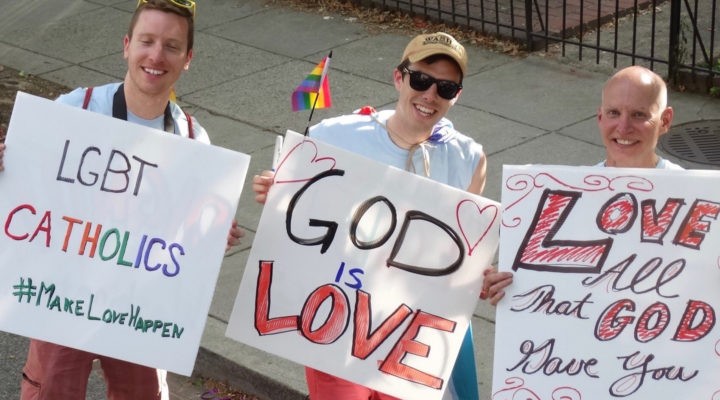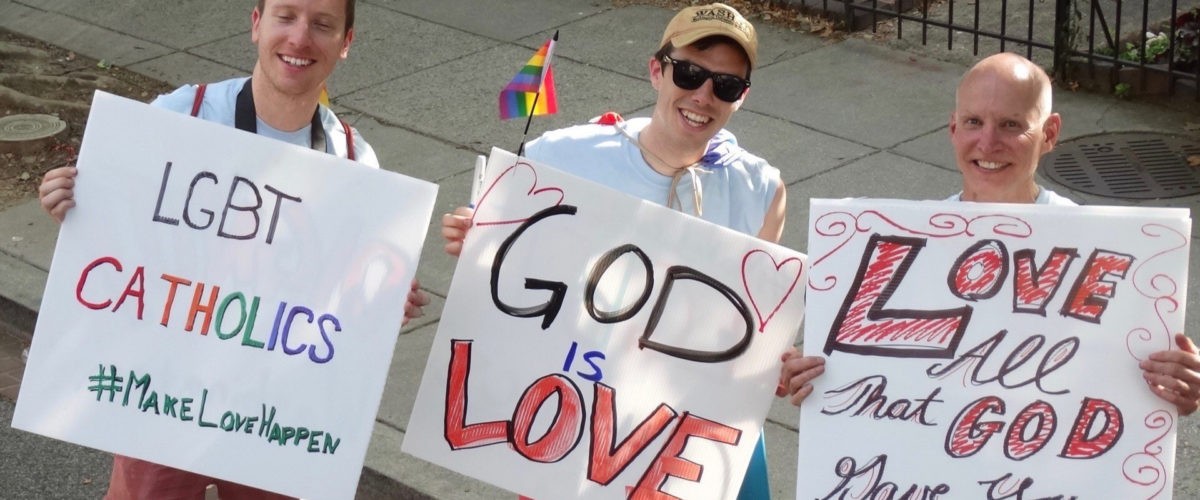Pope Francis signaled a bit of welcome for LGBTQ Christians in October, but the Vatican made clear March 15 that the Catholic Church will not bless same-sex unions, which it considers to be a sinful “choice.”
While the pope is the authoritative leader of the Catholic Church, doctrinal statements most often are promulgated by groups of Catholic clergy, including the Congregation for the Doctrine of the Faith. It is this group that created the statement released this week that same-sex unions are illicit in the church’s eyes and cannot be blessed.
Some LGBTQ Catholics and allies saw a glimmer of hope for their inclusion in October, when a new documentary debuted in Rome, with Pope Francis saying those who identify in the LGBTQ community “have the right to be in a family.”
In the documentary Francesco, which will begin streaming in the United States March 26, Francis says of gay, lesbian, bisexual, transgender and queer persons: “They are children of God. You can’t kick someone out of a family, nor make their life miserable for this. What we have to have is a civil union law; that way they are legally covered.”
A definitive denial
However slightly that door appeared to be cracked open, it got slammed shut March 15 with a declaration from the Vatican that the church does not have the power to give blessing to unions of persons of the same sex.
The Vatican’s explanation said the Catholic church cannot “approve and encourage a choice and a way of life that cannot be recognized as objectively ordered to the revealed plans of God.”
Further, the Vatican’s explanation said the Catholic church cannot “approve and encourage a choice and a way of life that cannot be recognized as objectively ordered to the revealed plans of God.”
The use of that phrase and of the word “choice” are footnoted to reference a 1986 pastoral letter from Pope Benedict XVI called “On the Pastoral Care of Homosexual Persons.”
While the 1986 pastoral letter from the Congregation for the Doctrine of the Faith does not use the word “choice” in the same way, it emphatically labels same-sex relations as sin:
“Although the particular inclination of the homosexual person is not a sin, it is a more or less strong tendency ordered toward an intrinsic moral evil; and thus the inclination itself must be seen as an objective disorder.”
The case against same-sex unions
This week’s statement from the Vatican acknowledges that some within the church seek approval of same-sex unions and that such requests often are “motivated by a sincere desire to welcome and accompany” gay Christians as they seek to “understand and fully carry out God’s will in their lives.”
While asserting that “God loves every person, and the church does the same,” those who seek to bless same-sex unions do not qualify for such a blessing, the Vatican said.
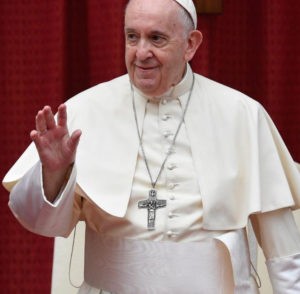
Pope Francis
“It is not licit to impart a blessing on relationships, or partnerships, even stable, that involve sexual activity outside of marriage …, as is the case of the unions between persons of the same sex,” the statement explains. “The presence in such relationships of positive elements, which are in themselves to be valued and appreciated, cannot justify these relationships and render them legitimate objects of an ecclesial blessing, since the positive elements exist within the context of a union not ordered to the Creator’s plan.”
Proper Christian marriage, the document contends, may only be between one man and one woman. Therefore, to deny blessing to a same-sex union is not discrimination but an upholding of the church’s teaching.
The statement quotes a 2016 declaration by Pope Francis to say: “There are absolutely no grounds for considering homosexual unions to be in any way similar or even remotely analogous to God’s plan for marriage and family.”
This week’s message to leaders in the Catholic church is that it is OK to give blessings to “individual persons with homosexual inclinations” so long as they “manifest the will to live in fidelity to the revealed plans of God as proposed by church teaching.”
As is typically the case with such doctrinal position statements, the latest statement on same-sex unions was presented to Francis by the Congregation for the Doctrine of the Faith, and Francis “gave his assent” to it on Feb. 22.
Reaction to the Vatican declaration
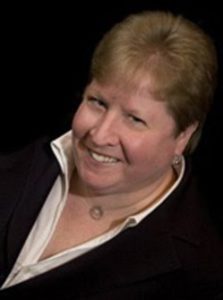
Marianne Duddy-Burke
DignityUSA, an organization of Catholics working for full inclusion of LGBTQ people in the church, expressed disappointment with the Vatican’s statement.
“The Vatican’s denial of blessings to same-sex couples will exacerbate the pain and anger of LGBTQI Catholics and our families. This statement is hurtful to same-sex couples, and dismissive of the grace demonstrated by same-sex couples who live deeply loving and committed relationships,” said Marianne Duddy-Burke, executive director.

Ross Murray
Ross Murray, who oversees religious issues for the LGBTQ rights group GLAAD, told the Associated Press: “Having sin be explicitly included in this statement kind of brings us back to zero.” And he added: “The ability for us to live out our lives fully and freely is still seen as an affront to the church or, worse yet, an affront to God, who created us and knows us and loves us.”
Bill Donohue, president of the conservative group the Catholic League expressed delight with the March 15 announcement.
“There will be no recognition of homosexual unions or marriage by the Catholic church. It is non-negotiable. End of story,” he said. “Pope Francis has been under considerable pressure by gay activists, in and out of the church, to give the green light to gay marriage. The statement released by the Congregation for the Doctrine of the Faith to queries on this issue is the most decisive rejection of those efforts ever written.”
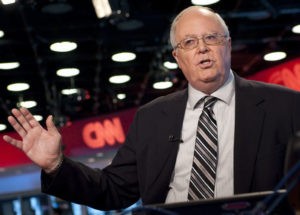
William Donohue (Photo by Tim Knox via the Catholic League)
His interpretation of the statement: “It is homosexual unions that are the problem, not homosexuals.”
However, he too called attention to the specific language of the Vatican statement referencing “choice” and “a way of life.”
“The Vatican left nothing on the table,” he said. “The door has been slammed shut on the gay agenda.”
While the Vatican statement resonates with the values expressed by many conservative evangelical groups, as of Monday evening, March 15, none of the most prominent of those organizations had issued any public statements about the matter.
Fighting public opinion
In the United States, the Vatican’s reinforced hard line against same-sex unions likely will deepen the chasm that already exists between Catholic teaching and public opinion on major social issues.
American public opinion has swung wildly in favor of same-sex unions in recent years. In fact, public opinion has shifted so rapidly that social scientists at first questioned the data. This seismic shift was the subject of entire episode of the NPR show “Hidden Brain” in 2019.
American public opinion has swung wildly in favor of same-sex unions in recent years.
“This is actually one of the most surprising things in the whole history of public opinion,” Stanford sociologist Michael Rosenfeld told the NPR show. “There’s more and more rapid change in attitudes towards gay rights in the past 30 years in the United States than there ever has been in recorded attitudes in the United States on any issue.”
In 1988, the U.S. General Social Survey began asking Americans whether gay people should have the right to marry. That year, less than 12% of respondents said yes — a statistically insignificant number. Within the span of 30 years, however, the tide turned. By 2018, 68% of Americans said gay couples should have the right to marry. And this shift was recorded across some surprisingly conservative demographic groups.
This data more recently was confirmed by the research firm PRRI. In its 2020 omnibus poll of American attitudes, the firm asked whether respondents thought gay and lesbian couples should be allowed to marry legally. It found 70% of all Americans saying yes and only 28% saying no.
This affirmation was found among majorities of Democrats (80%) and independents (76%) and half of Republicans (50%). Aside from white evangelical Protestants — who PRRI reports as outliers in many areas of American life today — majorities in every other major religious group were found to support marriage equality. That includes 78% of Hispanic Catholics and 67% of white Catholics.
A global church
The Roman Catholic Church, however, is a global church — and opinions in other countries where Catholicism is strong often are not as bent toward marriage equality. The same issue has dogged the United Methodist Church, with its African clergy and churches strongly against same-sex marriage while the majority of U.S. Methodist clergy support same-sex marriage.
Northern Ireland ranks among all countries in Europe as home to intensely devout Catholics, and same-sex marriage became legal there in October 2019 —due to action by the United Kingdom’s Parliament in London.
Spain, meanwhile, narrowly legalized same-sex marriage in 2005, prompting harsh criticism from Vatican officials and the Catholic Spanish Bishops Conference.
Closer to the Vatican, Italy legalized same-sex civil unions — but not marriage — in 2016.
Public opinion … has not previously swayed the Catholic Church any more than it has swayed evangelical Christians.
In Latin America, Argentina in July 2010 became the first country to legalize same-sex marriage. That happened despite opposition from the Catholic Church and evangelical Protestant churches.
Even when public opinion swings toward marriage equality, that has not previously swayed the Catholic Church any more than it has swayed evangelical Christians. The reason, in both cases, is strong doctrinal beliefs that are seen as standing against an ever-more-promiscuous culture.
Duddy-Burke of DignityUSA suggested the latest disallowance of same-sex unions by the Vatican likely was driven by Catholic bishops in Germany and elsewhere facing down a tide of public opinion against the church.
“Significant numbers of Catholics, even majorities in many parts of the world, already affirm and celebrate the relationships their gay and lesbian family members and friends have created,” Duddy-Burke said. “They happily attend and celebrate our marriages and shower their blessings upon us. They show that they understand the church’s own theology, that teaches that the commitment a couple makes to one another is sacramental, is holy. The rest of those in attendance, including a priest, are witnesses to that sacred act.”
Related articles:
Francesco will restore your faith in a broken church | Opinion by Craig Martin
LGBTQ inclusion and clergy sexual abuse treated equally in SBC expulsions
Top-down schism plans ignore local United Methodist churches’ new reality

